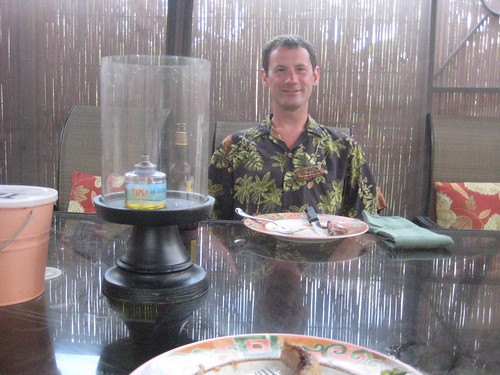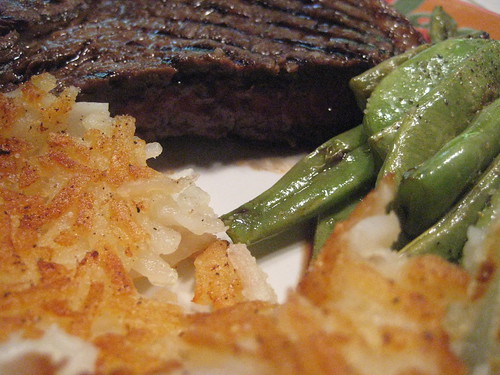
Breakfast today was my usual muffin, and lunch was a bit of leftover nachos from last night. In between and after we hit the Kapoho tidepools down the road and I spotted another moray eel - this one an adult the size of my arm. Tomorrow we're planning a drive over to the Kona side of the island in order to visit Pu'uhonua o Honaunau, which is having a Hawaiian Cultural Festival all weekend, so today we laid low at 'home', doing a lot of reading.
So far on the trip, I've finished two books - one today - both of which I've enjoyed, and both of which were (not surprisingly) food related.
The first was Meat: A Love Story
Her writing is sharp and the prose is fast paced, and the fact that she was able to get herself invited or at least allowed into the placed she did is admirable. The only thing that kept bothering me while reading the book was the recurring theme of her being very, very bad at everything she tried to do. From being so bad at breaking down chicken that she's assigned to wrap meat in paper at the Pizzuco's butcher shop, to falling to the ground (and getting kicked out) of the kitchen at Pappas Bros. Steakhouse. It seemed to happen every chapter, every challenge she faced. And it got a little old to me. It came across at times as comical, but usually seemed a self-deprecating type of humor usually put forward by those lacking self-confidence, looking for others to build them up. It may have been the truth, but it seemed played up, and after ten chapters of it, seemed almost anti-feminist: a 250+ page declaration of how bad this woman is at "man's work". But still a good read, particularly for anyone wanting as much insight into the world of meat that they can get their hands on.
The book I finished today was Coop: A Year of Poultry, Pigs, and Parenting
Interestingly enough, this author also admits his inadequacies boldly - and they're illustrated in several building projects he finds a way to mess up. Perhaps the fact that this is a memoir creates the balance necessary for those moments to not paint him as incompetent, but I think the difference is that Perry writes about those mistakes in a way that shows how focused and mindful he was of trying to do the right thing, but just not getting it right, whereas Bourette comes across as not paying attention, doing things half-heartedly, and thus failing. I think that's why the moments of self-deprecation in Perry's book came across as honesty whereas I question the truth of Bourette's falls and failures.
I started a third book, called Buddhism of the Heart: Reflections on Shin Buddhism and Inner Togetherness
I got an advanced copy of Chris Anderson's latest economic exploration, Free: The Future of a Radical Price
Assuming I knock Free out before our time here is up, I'll be back to food related reading with The Perfect Fruit: Good Breeding, Bad Seeds, and the Hunt for the Elusive Pluot

And now that my Summer reading is dissected completely, I should probably return to more solidly foodie matters - like what I made us for dinner.

I began marinading a beautiful, grass-fed, locally raised steak yesterday in lots of ginger, garlic, and soy sauce, and tonight I seared it off on the grill, and served it with some grilled long beans we bought at the farmers market, and some pre-fab, frozen hash browns (a request from Dan, as he's been craving them). At first, I thought I'd mistakenly overcooked the beef - tasting a bite from the end that seemed beyond medium-rare, and noticing the depth of color of the meat. But then I realized the color was largely the soy sauce marinade having penetrated the meat, and (aside from the end bite) was seared on the outside but juicy and delicious in the middle. I dare say it was possibly my best steak cooking performance. So many years of vegetarianism have left me behind on learning to properly cook meat, but I may finally be getting the hang of it. Dan seemed to think so.

(Dan's writing all about our trip over at our other blog, The Dans In Hawai`i, so I'll just stick to writing what I know: food.)






1 comment:
I am working my way backwards through your posts. I love it. I heard about it from your mom :) I finally registered so now I can leave comments, otherwise I would of made many more before now. This post struck me not only because I love books, but I also love steaks and hashbrowns. I would eat potatoes every meal if I could. :) I wrote down the Free book to think about reading. It sounds really interesting.
Post a Comment